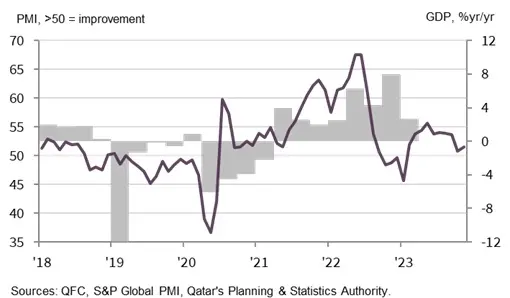PHOTO
- Backlogs increase for first time since July 2022
- Employment continues to expand
Doha, Qatar – Qatar's non-energy private sector continued to record an improvement in business conditions towards the end of 2023, according to the latest Purchasing Managers’ Index™ (PMI®) survey data from Qatar Financial Centre (QFC). Moreover, the rates of expansion in output and new business accelerated since October. The rise in the latter was sufficient to generate an increase in the level of outstanding business for the first time in over a year, despite a further rise in employment. Financial services remained at the forefront of private sector growth in the latest period.
The Qatar PMI indices are compiled from survey responses from a panel of around 450 private sector companies. The panel covers the manufacturing, construction, wholesale, retail, and services sectors, and reflects the structure of the non-energy economy according to official national accounts data.
The headline Qatar Financial Centre PMI is a composite single-figure indicator of non-energy private sector performance. It is derived from indicators for new orders, output, employment, suppliers’ delivery times and stocks of purchases.
The PMI registered 51.5 in November, up from 50.8 in October. This signalled a tenth successive month-on-month improvement in business conditions, and the first acceleration in growth since July.
Total business activity among Qatari non-energy private sector firms rose further in November. Output has risen every month since July 2020, except for a brief correction in January following the conclusion of the FIFA World Cup Qatar 2022™. The overall rate of expansion accelerated since October, with manufacturing posting the fastest growth.
New business increased for the tenth successive month in November, with strong sales at goods producers and construction firms in particular. The overall rate of expansion accelerated for only the second time in six months.
The pick-up in demand in November translated into a rise in outstanding business for the first time in 16 months. This increase in pressure on capacity occurred despite a sustained expansion in employment.
Supply chains continued to improve in November, as lead times for inputs shortened for the nineteenth consecutive month. Purchasing of inputs expanded for the ninth straight month and at the fastest rate in four months as firms aimed to address rising backlogs. Input stocks rose for the first time in three months as a result.
Overall cost pressures at Qatari firms rose slightly in November, having fallen in October. That said, the rate of input price inflation was relatively weak, with only slight increases in both staff and non-staff costs. Prices charged for goods and services were broadly stable following increases in September and October.
QFC Qatar PMI vs. GDP


Financial Services
Financial services remains a leading sector in November
- Growth of activity remains faster than wider economy
- Slowest increase in new business for over a year
- Fastest rise in input prices since January
Qatari financial services companies recorded another increase in total business activity in November. The seasonally adjusted Financial Services Business Activity Index posted 54.7, still comfortably above the overall private sector figure of 52.5 albeit the lowest in over two years.
Growth of total activity remained solid despite the slowest increase in new business in over a year. That said, demand was strong overall and more robust than the non-energy sector average, and the 12-month outlook for activity improved. Meanwhile, employment at financial services firms rose for the eighth month running.
In terms of prices, average input costs rose at the fastest rate since January, while charge inflation moderated.
Comment
Yousuf Mohamed Al-Jaida, Chief Executive Officer, QFC Authority:
“The rise in the headline PMI is welcome news towards the end of 2023, reflecting faster rates of expansion in both new business and output. Financial services in particular remains a bright spot. The PMI is currently trending at 52.6 in 2023 so far, representing a softer rate of economic growth compared with last year during the lead-up to the FIFA World Cup Qatar 2022™, but still above its long-run trend of 52.3.
"November's rise in outstanding business, the first in over a year, suggests that companies are increasingly busy. This will spur further investment as customer numbers rise and companies bring improved products and services to the market. Higher backlogs in November were accompanied by increased staffing, purchasing and input stocks."
"Inflationary pressures remain manageable, with only a slight rise in input prices and broadly stable charges in the latest period."
ABOUT THE QATAR FINANCIAL CENTRE
The Qatar Financial Centre (QFC) is an onshore business and financial centre located in Doha, providing an excellent platform for firms to do business in Qatar and the region. The QFC offers its own legal, regulatory, tax and business environment, which allows up to 100% foreign ownership, 100% repatriation of profits, and charges a competitive rate of 10% corporate tax on locally sourced profits.
The QFC welcomes a broad range of financial and non-financial services firms.
For more information about the permitted activities and the benefits of setting up in the QFC, please visit qfc.qa
@QFCAuthority | #QFCMeansBusiness@QFCAuthority | #QFCMeansBusiness
MEDIA CONTACTS
QFC: Rasha Kamaleddine, Marketing & Corporate Communications Department, r.kamaleddine@qfc.qa
ENQUIRIES ABOUT THE REPORT
QFC: qatarpmi@qfc.qa
ABOUT S&P GLOBAL
S&P Global (NYSE: SPGI) S&P Global provides essential intelligence. We enable governments, businesses and individuals with the right data, expertise, and connected technology so that they can make decisions with conviction. From helping our customers assess new investments to guiding them through ESG and energy transition across supply chains, we unlock new opportunities, solve challenges, and accelerate progress for the world.
We are widely sought after by many of the world’s leading organizations to provide credit ratings, benchmarks, analytics and workflow solutions in the global capital, commodity, and automotive markets. With every one of our offerings, we help the world’s leading organizations plan for tomorrow, today. www.spglobal.com.
ABOUT PMI
Purchasing Managers’ Index™ (PMI®) surveys are now available for over 40 countries and for key regions including the Eurozone. They are the most closely watched business surveys in the world, favoured by central banks, financial markets and business decision makers for their ability to provide up-to-date, accurate and often unique monthly indicators of economic trends.
www.spglobal.com/marketintelligence/en/mi/products/pmi.html
METHODOLOGY
The Qatar Financial Centre PMI® is compiled by S&P Global from responses to questionnaires sent to purchasing managers in a panel of around 450 private sector companies. The panel is stratified by detailed sector and company workforce size, based on contributions to GDP. The sectors covered by the survey include manufacturing, construction, wholesale, retail, and services.
Survey responses are collected in the second half of each month and indicate the direction of change compared to the previous month. A diffusion index is calculated for each survey variable. The index is the sum of the percentage of ‘higher’ responses and half the percentage of ‘unchanged’ responses. The indices vary between 0 and 100, with a reading above 50 indicating an overall increase compared to the previous month, and below 50 an overall decrease. The indices are then seasonally adjusted.
The headline figure is the Purchasing Managers’ Index™ (PMI). The PMI is a weighted average of the following five indices: New Orders (30%), Output (25%), Employment (20%), Suppliers’ Delivery Times (15%) and Stocks of Purchases (10%). For the PMI calculation the Suppliers’ Delivery Times Index is inverted so that it moves in a comparable direction to the other indices.
Underlying survey data are not revised after publication, but seasonal adjustment factors may be revised from time to time as appropriate which will affect the seasonally adjusted data series.
Data were collected 9-23 November 2023.
For further information on the PMI survey methodology, please contact economics@spglobal.com.
CONTACT
S&P Global: Sabrina Mayeen
E. Sabrina.mayeen@spglobal.com




















